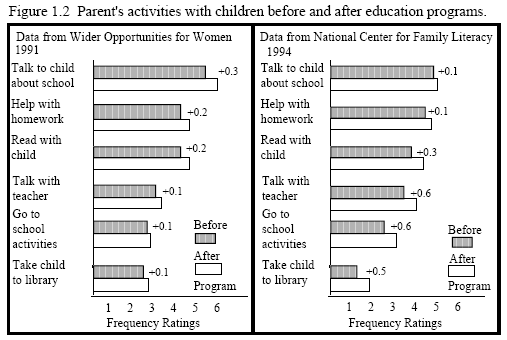
An important aspect of the WOW study was that the mother's children showed educational improvements even though the WWFN programs involved had not set out to do anything other than educate the mothers. While some programs emphasized to mothers the importance of their being involved with their children's education, there were no systematic programs designed to have the mother's educational achievements transfer to benefit their children's educational achievements. This sort of “intergenerational transfer” of better attitudes toward education and improved behavior to their children’s educational needs occurred simply because the women themselves were engaged in basic skills education.
A Learner-Centered, Participatory Method for Developing a Parenting Program The mothers who participated in filling-out questionnaires read sections asking questions about how often they read to their children, how often they participated in school activities, etc. While doing this, many expressed surprise to learn that they could be doing things to improve their children's pre-school and in-school learning and achievement. Many mothers began coming up with ideas for how they could become better teachers for their children.
This suggests that a low-cost approach to the development of a parenting program could involve the mothers in their education and training courses to develop their own ideas about how they might improve their own literacy, mathematics and other skills while also learning more about and going about helping their children learn more.
Program operators could provide resources, such as guidance in using libraries and bookstores for finding useful resource materials. They could also invite specialists from universities and family literacy programs to speak to their clients. Cameras for making picture books, paper for drawing sketches and for children to "scribble-write" or to print and write on could be provided. But the mothers themselves could develop the materials that they would use to interact with their children and their children's schools. By using this learner-centered, participatory approach, an intergenerational literacy program can be developed inexpensively. By engaging in the education of parents, we increase the educability of children. This is just one of the reasons we need to find ways to reach a larger number of youth and adults with functional context education.